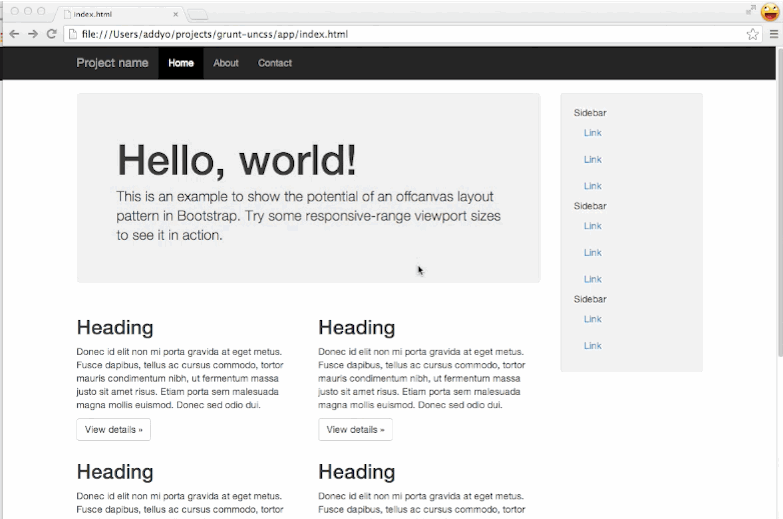A grunt task for removing unused CSS from your projects. Works across multiple files and supports dynamically injected CSS via PhantomJS.
Taking a multi-page project using Bootstrap with >120KB of CSS down to 11KB.
This plugin requires Grunt ~0.4.0
If you haven't used Grunt before, be sure to check out the Getting Started guide, as it explains how to create a Gruntfile as well as install and use Grunt plugins. Once you're familiar with that process, you may install this plugin with this command:
npm install grunt-uncss --save-devOnce the plugin has been installed, it may be enabled inside your Gruntfile with this line of JavaScript:
grunt.loadNpmTasks('grunt-uncss');Run this task with the grunt uncss command.
Task targets, files and options may be specified according to the grunt Configuring tasks guide.
Remove unused CSS from projects using uncss.
Use the grunt-uncss task by specifying a target destination (file) for your cleaned CSS. Below this is dist/css/tidy.css.
Along-side, specify the input HTML files you would like scanned for used selectors.
In this case app/index.html and app/about.html are the two files we would like checked.
uncss: {
dist: {
files: {
'dist/css/tidy.css': ['app/index.html','app/about.html']
}
}
}Which you can then use alongside a processor like processhtml to
rewrite the location of your stylesheet to tidy.css using a block
like:
<!-- build:css css/tidy.css -->
<link rel="stylesheet" href="css/normalize.css">
<link rel="stylesheet" href="css/main.css">
<link rel="stylesheet" href="css/bootstrap.css">
<!-- /build -->and some configuration like:
processhtml: {
dist: {
files: {
'dist/index.html': ['app/index.html'],
'dist/about.html': ['app/about.html']
}
}
}Sample use of all supported options:
ignore: ['#added_at_runtime', /test\-[0-9]+/],
media: ['(min-width: 700px) handheld and (orientation: landscape)'],
csspath: "../public/css/",
raw: 'h1 { color: green }',
stylesheets: ["lib/bootstrap/dist/css/bootstrap.css", "src/public/css/main.css"],
urls: ["http://localhost:3000/mypage", "..."] //array of urls,
report: 'min'/'gzip',
timeout: 1000,
htmlroot: 'public'
-
ignore (Array): provide a list of selectors that should not be removed by UnCSS. For example, styles added by user interaction with the page (hover, click), since those are not detectable by UnCSS yet. Both literal names and regex patterns are recognized.
-
media (Array): by default UnCSS processes only stylesheets with media query "all", "screen", and those without one. Specify here which others to include.
-
csspath (String): path where the CSS files are related to the html files. By default, UnCSS uses the path specified in the <link rel="stylesheet" href="path/to/file.css">
-
stylesheets (Array): use these stylesheets instead of those extracted from the html files.
-
raw (String): give the task a raw string of CSS in addition to the existing stylesheet options; useful in scripting when your CSS hasn't yet been written to disk.
-
urls (Array): array of URLs to load with Phantom (on top of the files already passed if any).
-
report ('min'/'gzip'): specify whether to print out only the minification result or report minification and gzip results, using maxmin.
-
timeout (Number): specify how long to wait for the JS to be loaded.
-
htmlroot (String): where the project root is. Useful for example if you are running UnCSS on local files that have absolute href to the stylesheets, i.e.
href="/css/style.css"
// Remove unused CSS across multiple files
uncss: {
dist: {
files: {
'dist/css/tidy.css': ['app/index.html','app/about.html']
}
}
}// Remove unused CSS across multiple files and ignore specific selectors
uncss: {
dist: {
files: {
'dist/css/tidy.css': ['app/index.html','app/about.html']
}
},
options: {
ignore: ['#added_at_runtime', '.created_by_jQuery']
}
},
options: {
ignore: ['#added_at_runtime', '.created_by_jQuery']
}
}There is a test project included under the tests/app directory which you can build by running grunt after an npm install.
It also includes a grunt compare_size task for getting a feel of the before and after CSS sizes:
User-interface libraries like Bootstrap, TopCoat and so on are fairly prolific, however many developers
use less than 10% of the CSS they provide (when opting for the full build, which most do). As a result, they can
end up with fairly bloated stylesheets which can significantly increase page load time and affect performance.
grunt-uncss is an attempt to help with by generating a CSS file containing only the CSS used in your project,
based on selector testing.
There have been many efforts to try solving the problem of finding unused CSS in the past. Opera created ucss, @aanand created (https://github.com/aanand/deadweight), Brian Le Roux CSS Slap Chop and there were a number of client-side solutions also crafted, such as Helium-CSS, CSSESS and the Python mincss.
Unfortunately, most of these solutions don't actually generate what you're really after - a leaner build of your project CSS containing only those rules you used. Finding that a more recent project called uncss did try tackling this, I set out to share some of the problems we need to solve in this space with the developer and build a Grunt task to enable usage of it in builds more easily.
Huge thanks go out to Giacomo Martino for his help with the Node module this task uses.
- Automating the removal of unused CSS - VelocityConf
- Use Grunt and UnCSS to speed up the load time of your site
- Automating Front-end Workflow (slides)
Please note that the CSS parser used in the uncss module we rely on currently isn't able to work with complex selectors.
For example [data-section=''] > section > [data-section-title] a. This may mean that at build time you run into exceptions
such as TypeError: Cannot convert undefined or null to object. If this is the case, please consider moving these selectors
to a separate stylesheet which the task does not run on.
We are actively looking at how to improve the CSS parsers used and will update this notice once this problem has been solved.
(C) Addy Osmani 2013, released under an MIT license





